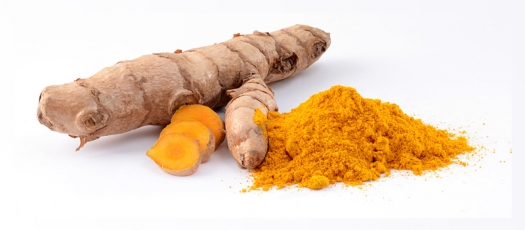I’ve always loved Indian food. My wife, Connie, makes a delicious chicken tikka masala, and when we eat out, we often go to our favorite Indian restaurant. But I’ve liked it all the more since I became aware of the therapeutic properties of turmeric, a signature spice of Indian cuisine.
Turmeric does more than give curry its bright color. This herb has been a revered remedy in Ayurvedic medicine for millennia, and in the past 15 years, nearly 6,500 scientific papers have been published on the therapeutic properties of turmeric and curcumin, its most active constituent. It turns out that curcumin is an exceptionally potent anti-inflammatory and antioxidant with benefits for a wide variety of health concerns.
Alzheimer’s breakthrough!
My initial interest in turmeric was sparked by an article I read years ago about the low relevance of Alzheimer’s in India. The disease affects 1.5 percent of all people over age 65 and less than 1 percent in rural areas. In contrast, Alzheimer’s affects 11 percent of US adults in this age group. The article discussed possible reasons for this striking difference – and one of them was Indians’ hearty consumption of turmeric.
This makes a lot of sense. Inflammation is a key contributor to Alzheimer’s and other neurodegenerative disorders. Researchers have discovered that curcumin can cross the blood-brain barrier and help to reduce neuro-inflammation, improve brain function in healthy adults, and discourage the buildup of amyloidbeta, the primary component in the plaques that junk up the brain in Alzheimer’s. It actually helps clear amyloid-beta from the brain!
I believe supplemental curcumin may be our best hope for preventing and treating this ravaging disease. Experts agree that none of the approved drugs currently available are very effective, and 99.6 percent of new Alzheimer’s drug trials have failed. That’s why pharmaceutical companies and universities are testing turmeric-based compounds as a therapy for Alzheimer’s, and pilot studies are quite encouraging.
Inflammation and pain
Since curcumin reduces inflammation, it should come as no surprise that it also relieves pain. In a 2014 study, researchers enrolled patients with osteoarthritis of the knee and gave them either a curcumin extract or a placebo three times a day. When they were reevaluated after six weeks, significantly greater improvements in pain and function were noted in the participants who were taking curcumin.
Curcumin’s benefits also extend to autoimmune diseases. Patients with active rheumatoid arthritis were randomly assigned to take 500 mg of a curcumin extract, 50 mg of diclofenac (a prescription anti-inflammatory), or both the drug and the supplement. When they were evaluated after eight weeks for changes in disease activity and joint pain and swelling, guess which group came out on top?
Curcumin – by itself!
At Whitaker Wellness, we also recommend supplemental curcumin for neuropathy, back and neck pain, sprains and strains, and other types of pain. I can personally attest to its efficacy. For years, I’ve dealt with periodic bouts of low back pain. I find that when I take curcumin regularly – and remember to take a couple of capsules prior to exercise – I’m less likely to have flare-ups.
The “Golden Spice”
In ancient Ayurvedic medicine, the “golden spice” was used to treat a multitude of conditions, and modern research supports a broad range of benefits. Turmeric extracts have been demonstrated to improve symptoms of indigestion, including pain, belching, and flatulence, and to help patients with ulcerative colitis (an inflammatory bowel disease) stay in remission.
A 2014 clinical trial found it to be as effective as Prozac for major depressive disorder – without the dangerous side effects of antidepressants. Liver disease, diabetic retinopathy, chronic gingivitis (gum disease), and psoriasis are among the many additional conditions that have responded to curcumin extracts.
It also interferes with tumor growth, in part by blocking the generation of new blood vessels that feed the tumor. Curcumin is currently being investigated as an adjunct therapy for cancer of the colon, breast, and other sites and as a treatment to alleviate side effects associated with chemotherapy and radiation.
Curry or supplements?
The average daily intake of turmeric in India is about 2,000 mg, and 5-10 percent of that, roughly 125 mg, is curcumin. Most of us would be hard pressed to get anywhere near that much in our diet. You could eat powdered turmeric by the spoonful, but I can tell you from personal experience it’s not very palatable – or attractive.
There’s also a well-recognized problem with bioavailability. Turmeric compounds get “tagged” in the digestive tract and rapidly removed from the body, leaving little free curcumin in the blood. In India, this is overcome by a very large intake in combination with black pepper and oil or ghee (clarified butter popular in Indian cuisine), both of which increase bioavailability.
Manufacturers have come up with several ways to enhance bioavailability. Some combine turmeric or curcumin with piperine, the main constituent of black pepper, and this is moderately effective. Meriva, a brand we use at the clinic, binds curcumin to phosphatidylcholine, which dramatically increases blood levels. Longvida, which we also use at the clinic and is the formula selected by UCLA scientists in their Alzheimer’s disease research, is specially encapsulated with lipids and has been proven to cross the blood-brain barrier.
These advanced systems boost delivery of free curcumin and require much lower dosing.
For example, researchers conducted a small study involving healthy people ages 40–60 who took just 400 mg of Longvida, containing 80 mg of curcumin, or a placebo every day for four weeks. Before-and-after blood and saliva tests showed significant and prolonged uptake of curcumin – plus reductions in triglycerides, antioxidant and inflammation markers, and amyloid-beta protein concentrations, and increases in nitric oxide. In other words, even a low dose of a highly bioavailable product can produce a number of health-enhancing effects.
If curcumin were a drug, it would be a blockbuster raking in billions for Big Pharma. But because it’s a nutritional supplement, it’s ignored by most doctors. That doesn’t change the fact that curcumin is one of the most promising and versatile therapeutic compounds – drug or supplement – currently available.
To learn more, visit Dr. Whitaker's website.
References
DiSilvestro RA, et al. Diverse effects of a low dose supplement of lipidated curcumin in healthy middle aged people. Nutr J. 2012 Sep 26;11:79.
Easton M. UCLA Alzheimer Transition Center. Curcumin. http://alzheimer.neurology.ucla.edu/Curcumin.html.
Panahi Y, et al. Curcuminoid treatment for knee osteoarthritis: a randomized double-blind placebo-controlled trial. Phytother Res. 2014 May 22. doi: 10.1002/ptr.5174. [Epub ahead of print]
Sanmukhani J, et al. Efficacy and safety of curcumin in major depressive disorder: a randomized controlled trial. Phytother Res. 2014 Apr;28(4):579–85.
Originally published in Health & Healing, October 2014, Vol. 24, No. 10. Used with permission.



